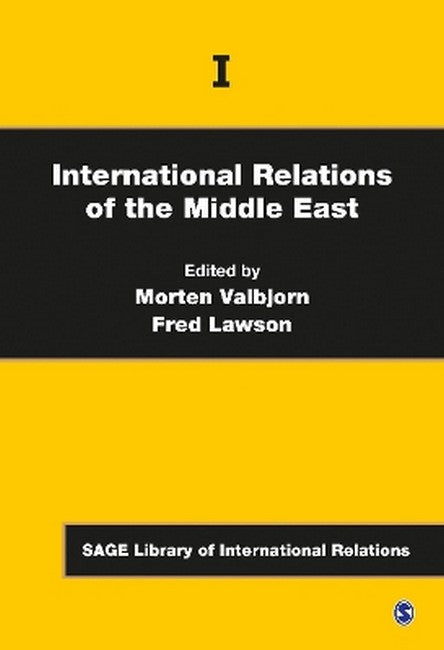VOLUME ONE: STUDYING INTERNATIONAL RELATIONS OF THE MIDDLE EAST (INTRODUCTION BY VALBJORN) Part One: What and Where Is the Middle East? Is There a Middle East? - Nikki Keddie Whose 'Middle East'? Geopolitical Inventions and Practices of Security - Pinar Bilgin Part Two: The Area Studies Controversy The Study of Middle East International Relations: A Critique - Fawaz Gerges The Middle East and International Politics - Fred Halliday Toward a 'Mesopotamian Turn': Disciplinarity and the Study of the International Relations of the Middle East - Morten Valbjorn Bridging the Gap: IR, Middle East Studies and the Disciplinary Politics of the Area Studies Controversy - Andrea Teti Part Three: Penetrated System or Discrete Regional Order? The Middle East as a Subordinate International System - Leonard Binder Extract from International Politics and the Middle East - L. Carl Brown The Absence of Middle Eastern Great Powers: Political "Backwardness" in Historical Perspective - Ian Lustick Part Four: Local Perspectives Systemic Approaches to Middle East International Relations - F. Gregory Gause III Dangerous Perceptions: Gulf Views of the U.S. Role in the Region - Abdullah Al-Shayeji The Politics of Studying Securitization? The Copenhagen School in Turkey - Pinar Bilgin Analyzing the Turkish-Iranian Relations from the Copenhagen School's Point of View - Rahmat Hajimineh VOLUME TWO: TRANSFORMATIONS OF THE MIDDLE EASTERN ORDER (INTRODUCTION BY LAWSON) Part One: Legacies of Empire The Origin of the French Mandate in Syria and Lebanon: The Railroad Question, 1901-1914 - William Shorrock Mosul, the Ottoman Legacy and the League of Nations - Sarah Shields Part Two: Origins of the Middle Eastern States-System The Origins of the Arab State System - Iliya Harik Westphalian Sovereignty and the Emergence of the Arab States System: The Case of Syria - Fred Lawson Part Three: Impact of the Cold War Strategy, Diplomacy and the Cold War: The United States, Turkey and NATO, 1945-1952 - Melvin Leffler Cold War and Covert Action: The United States and Syria, 1945-1958 - Douglas Little The 'New Deal' in Egypt: The Rise of Anglo-American Commercial Competition in World War II and the Fall of Neocolonialism - Robert Vitalis Part Four: Structures of Regional Politics The Struggle over Arab Hegemony after the Suez Crisis - Elie Podeh Arab Unity Schemes Revisited: Interest, Identity, and Policy in Syria and Egypt - Eberhard Kienle A Structural Analysis of the Situation in the Middle East in 1956 - Frank Harary Part Five: Great Power Intervention Nuclear Shadowboxing: Soviet Intervention Threats in the Middle East - Francis Fukuyama Deterrence and Compellence in the Gulf, 1990-91: A Failed or Impossible Task? - Janice Gross Stein The Role of Ideas in EU Reponses to International Crises: Comparing the Cases of Iraq and Iran - Benjamin Kienzle Part Six: The Middle East in the Twenty-First Century The Middle East in the World Hierarchy: Imperialism and Resistance - Raymond Hinnebusch The Gulf Sovereign Wealth Funds: Myths and Reality - Jean-Francois Seznec VOLUME THREE: IDEOLOGY AND RELIGION IN THE MIDDLE EASTERN ORDER (INTRODUCTION BY VALBJORN) Part One: Arabism and Westphalian Sovereignty Sovereignty, Statecraft and Stability in the Middle East - F. Gregory Gause III Sovereignty, Nationalism and Regional Order in the Arab States System - Michael Barnett Beyond Arabism vs. Sovereignty: Relocating Ideas in the International Relations of the Middle East - Ewan Stein Part Two: Arabism: Obsolete or Obstinate? The End of Pan-Arabism - Fouad Ajami A New Version of Pan-Arabism? - Hussein Sirriyeh Beyond the Arab Street: Iraq and the Arab Public Sphere - Marc Lynch The New Arab Cold War: Rediscovering the Arab Dimension of Middle East Regional Politics - Morten Valbjorn and Andre Bank Part Three: Islam and Regional Politics The Islamic Theory of International Relations and Its Contemporary Relevance - Majid Khadduri Imagining Pan-Islam: Religious Activism and Political Utopias - James Piscatori Global Intifadah? September 11th and the Struggle within Islam - Arshin Adib-Moghaddam Part Four: Non-State Actors: Islamist, Sectarian, Tribal The Middle East: Elusive Security, Indefinable Region - Ghassan Salame Global Jihadism after the Iraq War - Thomas Hegghammer When the Shiites Rise - Vali Nasr The Hizballah-Iran Connection: Model for Sunni Resistance - Graham Fuller VOLUME FOUR: CONFLICT AND CO-OPERATION IN THE MIDDLE EAST (INTRODUCTION BY LAWSON) Part One: Dynamics of Conflict Conflict Interactions in the Middle East, 1949-1967 - Jonathan Wilkenfeld, Virginia Lee Lussier and Dale Tahtinen The Impact of Israel's Reprisals on Behavior of the Bordering Arab Nations Directed at Israel - Barry Blechman Balance of Power or the State-to-Nation Balance: Explaining Middle East War-Propensity - Benjamin Miller Part Two: Patterns of Alignment Testing Theories of Alliance Formation: The Case of Southwest Asia - Stephen Walt Balancing What? Threat Perception and Alliance Choice in the Gulf - F. Gregory Gause III Economics and Shifting Alliances: Jordan's Relations with Syria and Iraq, 1975-81 - Laurie Brand Part Three: Regional Institutions Transformation of Regional Economic Governance in the Gulf Cooperation Council - Fred Lawson Designed to Fail or Failure of Design? The Origins and Legacy of the Arab League - Michael Barnett and Etel Solingen Part Four: Peculiarities of the Arab-Israeli Conflict The Impact of Palestine on Arab Politics - Walid Kazziha Strategic Beliefs and the Formation of Enduring International Revalries: Israel's National Security Conception, 1947-56 - Ben Mor Personal Whim or Strategic Imperative? The Israeli Invasion of Lebanon - Avner Yaniv and Robert Lieber Between Palestine and Lebanon: Seven Shi'i Villages as a Case Study of Boundaries, Identities and Conflict - Asher Kaufman

